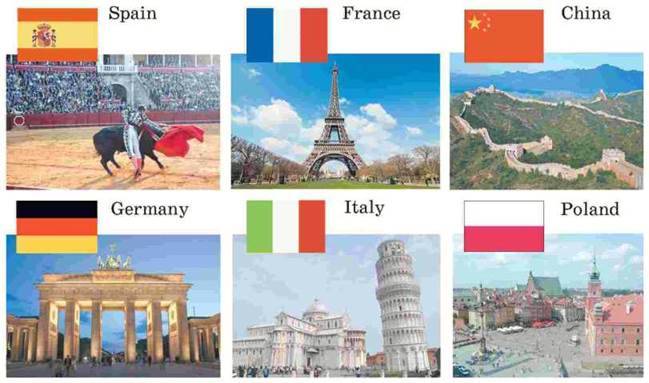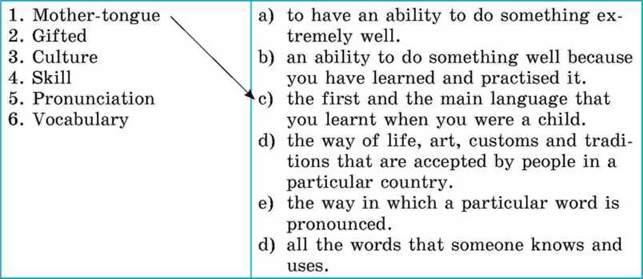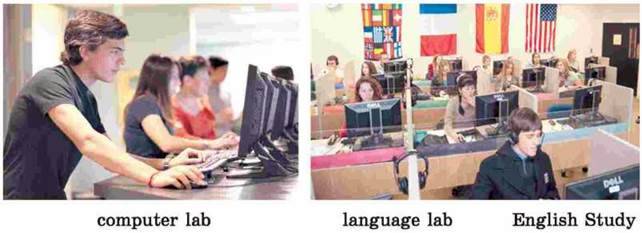A Creative Mind
Unit Three: School Life
3.3. A Creative Mind
Word Bank | Phrase Bank | Communication Box |
Mother-tongue Fluently Imitate Transcribe Gifted Culture | To master a language To improve pronunciation To develop speaking skills To role-play a dialogue To be excited about something To enlarge one’s vocabulary English-speaking countries | Firstly, … Secondly, … |
I. Conversation Warm-up
Look at the photos and say what the mother-tongue of the children is. Which foreign language do you want to learn and why?

Example: In Spain people speak Spanish. I also want to learn Spanish because I want to go to Spain to see the bull fight.
Spain
France – French (the French language)
China – Chinese (the Chinese language)
See First Aid Kit, Grammar, p. 212
II. Pronunciation Warm-up
Read and practise the sounds /w/ and /5/. Say what foreign languages you learn at school.
LANGUAGE CHANT
– What is your mother tongue, Roy?
– It’s English.
– What is your mother tongue, Hans?
– It’s German.
– What foreign languages do you learn at school?
– French and Spanish, Chinese and Japanese.
– Oh, it’s really very cool!
III. Grammar Smart
1. Complete the mini-dialogues, giving negative answers.
Example: A: May I take your dictionary?
B: No, you mustn’t. I need, it myself.
A: May I work on the computer?
B: …. We have other thing s to do.
A: Must I translate the sentence?
B: …. Ann has already done it.
A: May I answer the question?
В: …. Read it first.
A: Must I listen to the tape recorder?
B:
A: May I switch on my computer?
B: …. Work with your neighbour.
A: Must I water the flowers?
B: …. Ann has already done it.
2. Match the beginnings and the endings using a correct linking word (p. 82). Translate the sentences into Ukrainian.

Example: I adore English, that’s why I joined our English-speaking club. – Я обожнюю англійську мову, тому я приєдналася(вся) до клубу англійської мови.
4. Read the story and fill in and, but, so, because, that’s why.
MY ENGLISH LESSON
I have been learning English for five years and I like it a lot. It’s not that easy… but I work hard. I want to improve my pronunciation… I listen to different English texts every day. I speak English fluently… I communicate with my friends at the lessons. We role-play the dialogues… helps us to develop our speaking skills. Recently I’ve joined our English-speaking club…. I hope to learn more our about the English-speaking countries and their culture. Many pupils of our class joined it… Mr. Black came from the USA and teaches English. I learn how to be creative.
IV. Word Smart
1. Find the explanation of the following words and phrases and make
Up your own sentences with them.

2. Look at the pictures and say what the children do at their English lessons.

To listen to native | To type texts; | To role-play dialogues; |
Speakers; | To enlarge vocabulary; | To develop speaking skills; |
To imitate | To do tests. | To learn about the culture |
To improve pronunciation. | Of English-speaking countries. | |
3. Say what you must do:
1. to master the English language;
2. to improve pronunciation;
3. to develop speaking skills;
4. to enlarge your vocabulary;
5. to learn more about the culture of English-speaking countries.
At home: Write what you like/dislike about your English lessons.
Go to Ex. 45, 46 of your Workbook
V. Time to Read
1. Read the story “Discovery Class” and answer the following questions.
1. What was in the letter?
2. What was special about the teacher?
3. What did the children discover in Discovery Class?
DISCOVERY CLASS
The letter came the week after Sam’s birthday. It was from the school and addressed to her parents.
“Very interesting,” said Sam’s mother as she read it.
“What’s very interesting?” asked Sam.
“It seems they have chosen you to take part in the new gifted program”.
“Me?” said Sam.
She read the letter. It said that after careful testing, a small group of children had been selected to participate in a program for the gifted
Called “Discover”. These children would meet twice a week with a specially trained teacher Sarah Hoople.
Miss Hoople was a small, smiling person. She wore large round glasses. But what Sam noticed most was that she was excited about things. As she talked, her eyes sparkled and her hands moved.
“We only have an hour,” she told them, “so let’s get started.”
They started with a puzzle called “Can You Find the Treasure?” which had to do with an old man hiding a diamond ring in a half-ruined house. They should use logic to find it. Everyone called out ideas.
After they found the treasure, they went on to a word game. Miss Hoople called it “Reinventing Language”.
“Pretend you are a cave person,” she said. “And you are tired of pointing to things. You want to communicate with people. So you step out of your cave and look around. Up in the sky is a large bright object. What would you call it?”
“Oog,” said Marshall right away.
“Good,” said Miss Hoople, writing it on the blackboard.
“Glee,” said Katy.
“Excellent,” said Miss Hoople. “Any more?”…
“That was fun,” said Katy. “Can we do it again?” I like to be creative.
“Sure,” said Miss Hoople. “Maybe next time we’ll compile a cave dictionary.”
That, thought Sam, would really be something.
Adapted from “Dear Mom, You’re Ruining My Life”
By Jean Van Leenwen
To choose – choice
To discover – discovery
To excite – excitement
To puzzle – puzzle
To communicate – communication
To select – selection
See First Aid Kit: Word-building, p. 214
2. Fill in the right form of the word.
1. | It was a really great discovery. | To discover |
2. | I like to do this…. | To puzzle |
3. | I like… with my friends in English. | To communicate |
4. | All the children read the story with… ! | To excite |
5. | The teachers… Sam for the new programme. | To select |
6. | Sam’s parents were proud of the teachers’ …. | To choose |
VI. Time to Communicate
1. Imagine you are Sam. Tell your friends/parents about your Discovery Class. Begin with:
1. Miss Hoople is… .
2. She wears….
3. She is so excited….
4. We started with….
5. Everyone called… .
6. After that… .
7. We invited… .
8. It was fun to… .
9. We call out ideas and….
10. Maybe next time… .
2. In pairs, speak about your English lessons. Use the pattern.
Pattern:
A: I say… , English is… , isn’t it?
B: Right. I like English, because… .
A: What do you do… ?
B: Firstly, … ,secondly, … .And what about you? … ?
A: English is not… ,but… .
B: What do you… most of all?
A: As for me, … . It helps me… .
B: Agreed. And I advise you….
A: Thank you for advice. I…. I… .
3. Describe the English lesson you liked most.
III. Time to Write
Write what you think of the statement “The more foreign languages you know, the easier it is for you to study”. Begin with:
1. In my opinion… .
2. I believe… .
3. It seems to me… .
4. It’s absolutely right… .
5. It’s clear… .
6. To my mind….
Go to Ex. 47, 48 of your Workbook